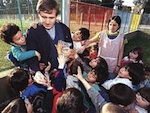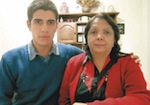| |
|
Argentine Victims Who Tried to Meet with Pope Francis
In Pope Francis's 21 years as bishop and archbishop of Buenos Aires, the Wall Street Journal reports, including the years
when he headed the Argentine bishops’ conference, he declined to meet with victims of sexual abuse.
On this page, we profile the Argentine survivors who sought Pope Francis’s help. All of them tried to contact the cardinal archbishop in 2002 or later – years when many bishops in the US and Europe disclosed numbers and names of abusive clergy, and when Pope Benedict issued repeated apologies [1, 2, 3, and 4] and met with victims five times, in the US, Australia, Malta, the United Kingdom, and Benedict’s home
country, Germany.
In addition to Bergoglio's failure to respond to victims, the public record contains no evidence that he released any information about abusers. In fact, he denied that the problem existed in his archdiocese. [For more information on Pope Francis's past management of clergy sexual abuse, see our special report.]
Now that Archbishop Bergoglio is Pope Francis, however, his perspective is broader and his responsibilities immeasurably greater. We have been told he will meet with Argentine victims before he visits his home country in 2016. When he does so, he should act decisively to correct his previous inaction and lack of transparency. He should explain fully why he commissioned a secret study in 2010 incriminating the brave victims of convicted child molester Rev. Julio César Grassi. He also should instruct all Argentine bishops to release comprehensive lists of all clergy who have been credibly accused of child sexual abuse. [See our Database of Publicly Accused Argentine Clergy.]
• "Gabriel," survivor of abuse by Fr. Julio César Grassi
• Julieta Añazco, survivor of abuse by Fr. Ricardo Giménez
• Sebastián Cuattromo, survivor of abuse by Brother Fernando Picciochi, S.M.
• Five Survivors of abuse by Fr. Mario Napoleón Sasso
• Gabriel Ferrini, survivor of abuse by Fr. Rubén Pardo. With his mother, Beatriz Varela |
| Survivor |
Accused Priest |
Attempts to Meet with Pope Francis |
"Gabriel"

PHOTO: Fr. Julio César Grassi, convicted for sexually abusing the victim known by the pseudonym "Gabriel" (not pictured here)
"Gabriel" was represented at trial by attorney Juan Pablo Gallego, member of CASACIDN, the Argentine committee that oversees the country's implementation of the Convention on the Rights of the Child.
|
Father Julio César Grassi is Argentina's most infamous pedophile priest, and Cardinal Bergoglio reportedly was his confidante. Founder of a national charity that shelters street children, Grassi was accused of sexually abusing at least five boys. In 2006, Bergoglio complained that there was a “media campaign” against Grassi, and during his long criminal trial, the celebrity priest claimed that Bergoglio 'never let go of his hand.' In 2009, Grassi was convicted of two counts of aggravated sexual assault and corruption in the case of "Gabriel," who was age 13 when Grassi attacked him. Bergoglio's secret intervention with judges after Grassi’s conviction is believed to be at least part of the reason that Grassi, despite a 15-year sentence, remained free for years pending the outcomes of his many appeals. Grassi finally was sent to prison September 2013, following the rejection of his third appeal by the provincial Supreme Court of Buenos Aires province. |
The victim known as Gabriel twice sought the pope's help, to no avail. In 2003, a year after Gabriel had filed criminal charges but before the start of Grassi's trial, three men ransacked the survivor's apartment and beat him. According to his psychiatrist, Enrique Stola, the men threatened to kill Gabriel if he did not retract his testimony and quit the case. Desperate to protect the young man, Stola telephoned the archdiocese and sent a fax seeking a meeting with Cardinal Bergoglio. He received no response. Ten years later, in May 2013, with Grassi still free despite his conviction in 2009, Gabriel and his attorney, Juan Pablo Gallego, brought a two-page letter addressed to Pope Francis to the office of the papal nuncio in Buenos Aires. An employee refused to accept the letter after learning of its topic and threatened to call security if Gabriel and Gallego did not leave the premises. |
Julieta Añazco

Survivor alleging child sexual abuse by Fr. Ricardo Giménez
|
Father Ricardo Giménez was arrested and imprisoned in 1996 for child molestation, after the mother of a 10-year-old altar boy filed a complaint stating that the priest had touched her son’s genitals and tried to kiss him on the mouth. The parents of four other boys also filed complaints. In 1997, in response to pressure from Plata archbishop Carlos Walter Galán Barry, a judge granted the priest’s release. Giménez maintained his innocence and described his accusers as “demonic and ungodly."
In 2013, 15-20 alleged Giménez victims came forward, beginning with Julieta Añazco, who said she was molested by Giménez from ages 7 to 10. In August 2013, Añazco and other alleged victims protested at the chapel of San Juan de Dios Hospital, La Plata, where Giménez was saying Mass. As of June 2014, he is listed as a priest on the La Plata archdiocesan website. |
In December 2013, Añazco and more than a dozen other alleged victims mailed a letter to Pope Francis describing their abuse by Giménez. Although Añazco received postal service confirmation in January 2014 that the Vatican received the letter, she has never received a response.
Julieta Añazco [Video by GlobalPost]
|
Sebastián Cuattromo

Survivor of child sex abuse by Bro. Fernando Picciochi, S.M.
Sebastián’s blog, "Abusos en el Instituto Marianista"
Co-Founder, “Adultxs por los derechos de la infancia” (Adults for the Rights of Children)
|
Brother Fernando Enrique Picciochi, S.M. molested seventh-grader Sebastián Cuattromo and a classmate in 1989 and 1990 on an end-of-year camping trip and at the Marianista de Caballito School in the city of Buenos Aires.
In 2000, Cuattromo and his former classmate reported Picciochi to the Marianists in Buenos Aires. The religious order persuaded them to accept $40,000 each in exchange for confidentiality and an agreement not to bring criminal charges against the order. Cuattromo did, however, immediately pursue a criminal case against Picciochi.
Soon afterwards, Picciochi was charged with ‘repeated corruption of minors’ but fled to the US before he could be detained. For the next ten years, Cuattromo worked with Interpol and other authorities to extradite Picciochi back to Argentina.
Picciochi finally was arrested in the US in 2007, and in 2010, he was brought back to Argentina. In 2012, he was sentenced to 12 years in prison for the sexual abuse of Cuattromo and four other children, all of whom had been Marianista School students. |
After Cuattromo discovered that Picciochi had fled to the US, he sought release from the gag order that the Marianists had imposed as a condition of his settlement.
In 2002, Cuattromo went to a secular body, the Legal Council of the city of Buenos Aires, which affirmed his right to break the confidentiality agreement. A Buenos Aires native, he then sought the help of the archdiocese. He was not granted a meeting with Cardinal Bergoglio but did meet with Martin Garcia Aguirre, Bergoglio's personal secretary, who sent him to speak to Father Mario Poli, vicar of the archdiocese’s Flores district. Cuattromo met twice with Poli, describing the Marianists’ attempt to silence him, Picciochi’s escape to the US, and Cuattromo’s desperation to bring his abuser back home to face prosecution. Cuattromo never heard back from the archdiocese.
Shortly after his election as pope, Bergoglio chose Poli to succeed him as Buenos Aires archbishop, and in 2014, he made Poli a cardinal.
Sebastián Cuattromo [Video by GlobalPost] |
Five Survivors
Names unknown
Ages 5 to 12 in 2002-2003, when abused by Fr. Mario Napoleón Sasso
Represented by Ernesto Moreau, co-president of the Permanent Assembly for Human Rights, Buenos Aires |
Fr. Mario Napoleón Sasso was diagnosed as a pedophile in the early 1990s. He was sent to Domus Mariae, a church-run treatment center for problem priests in the diocese of Zárate-Campana, in Buenos Aires province. He left the center in 1998 with instructions never to be in the company of children.
In 2001, the Zárate-Campana bishop assigned Sasso to a parish that housed a community soup kitchen in the city of Pilar. There Sasso sexually assaulted at least five girls, ages 5 to 12, all from extremely poor families. He would lure the girls into his bedroom with offers of candy and television, and then undress them, grope them, and masturbate in front of them. He threatened the girls to ensure their silence.
In 2003, a 12-year-old girl confided her abuse to Lia López, a woman who worked at the soup kitchen. López immediately contacted diocesan officials. When they failed to remove Sasso, López and a priest-psychiatrist named Luiz Guzmán went to law enforcement, which on 12/1/2003 issued an order for Sasso's arrest. Assisted by diocesan officials, Sasso fled to Paraguay but was captured by Argentine law enforcement a month later when he tried to re-enter Pilar. |
In 2006, with the criminal case against Sasso apparently stalled, the impoverished families of the young victims requested a meeting with Cardinal Bergoglio. Recently elected president of the Argentine bishops’ conference, Bergoglio was the country’s most powerful Catholic official, he publicly advocated for the poor, and his cathedral was located just 25 miles from the soup kitchen where the little girls had been assaulted. But the girls’ parents received no response.
Sasso was convicted in 2007 of first-degree sexual abuse of minors and was sentenced to 17 years in prison. While in prison, he got married, apparently after being granted voluntary laicization. In 2012, he was allowed a one-day furlough every month.
Ernesto Moreau [Video by GlobalPost] |
Gabriel Ferrini and Beatriz Varela

Gabriel Ferrini, survivor of abuse by Fr. Rubén Pardo
Gabriel's mother, Beatriz Varela
First plaintiffs to win a civil judgment against
the Argentine church for mismanaging
an abusive priest |
In 2002, Father Rubén Pardo sexually assaulted 15-year-old Gabriel Ferrini at the priest’s residence in Berazategui, in the diocese of Quilmes. The boy’s mother, Beatriz Varela, immediately met with Quilmes bishop Luis Stöckler and begged him to report Pardo to law enforcement and expel him from ministry. A few days later, Stöckler told the mother that Pardo had admitted to the assault but advised her to have mercy because celibates have "moments of weakness."
Stöckler gave Pardo a canonical reprimand, urging him to leave the diocese and refrain from saying Mass and heading confessions for one month. The bishop did not order Pardo to stay away from minors, remove him permanently from ministry, or report him to civil authorities. |
Soon after reporting Pardo to Bishop Stöckler, Varela and her son learned that Pardo carried the AIDS virus. Varela decided to file a complaint with the ecclesiastical tribunal in Buenos Aires, where she was rebuked by a monsignor, the tribunal’s president, who told her that this was a matter for her own bishop. Varela then went next door, to the Curia Metropolitana, and asked to meet with Cardinal Bergoglio. When the priest on duty insisted on knowing the reason for her visit, Varela said it was personal. She asked if she could relay her request in a private note to Bergoglio. The priest refused, and told her to leave. Varela told the Global Post that she was “belittled by Bergoglio’s staff and ultimately forcibly removed by security."
Ferrini and Varela filed a criminal complaint in February 2003, but prosecutors could not find Pardo. In September 2003, he was
discovered living in the Flores neighborhood of the city of Buenos Aires, at Condarco 581, a vicarage owned by the archdiocese of Buenos Aires, then still headed by Bergoglio. Pardo reportedly was hearing children’s confessions and teaching at a primary school in the Flores neighborhood.
In 2005, Pardo died of AIDS, ending the criminal case against him. In 2012, a Quilmes court ruled that the Quilmes diocese had been culpably negligent in managing Pardo. The diocese appealed, arguing : 1) that Pardo was an employee not of the diocese but of an autonomous parish; and 2) that Varela was partly responsible because she had allowed her son to spend the night at the priest’s residence. In 2013, the Quilmes appeals court rejected both arguments and upheld the ruling of the first court. The diocese was ordered to pay the plaintiffs compensatory damages of 155,000 pesos plus ten years’ interest. It is the first civil judgment against an Argentine diocese for mismanaging a sexual predator.
Beatriz Varela [Video by GlobalPost] |
|
.
|
|